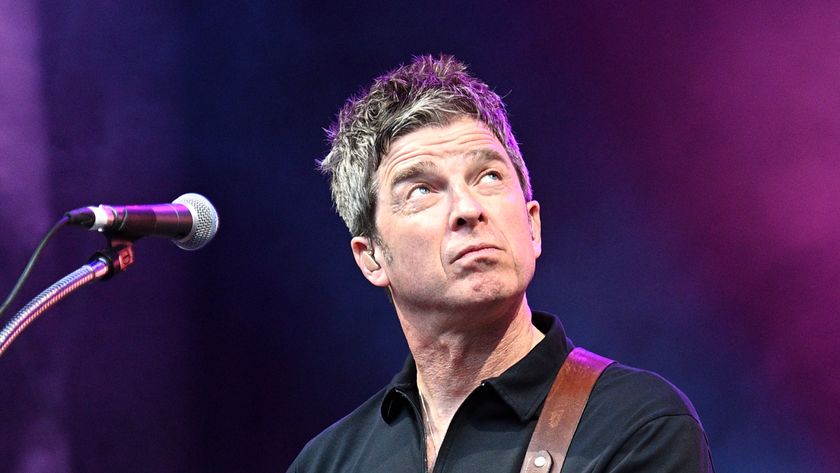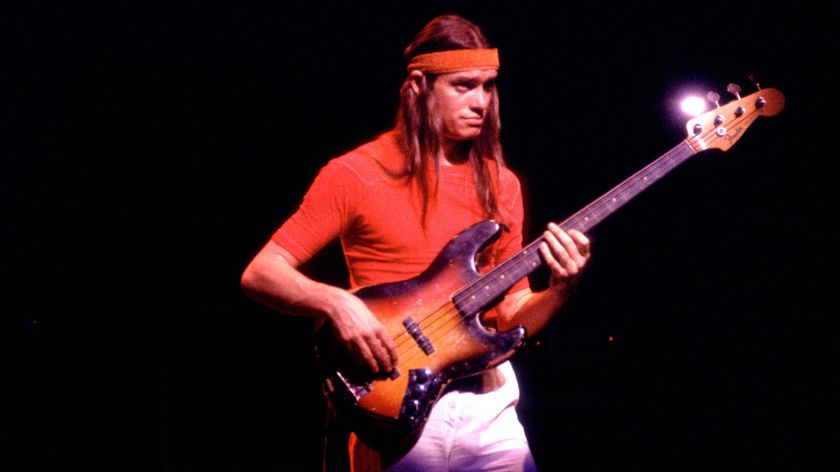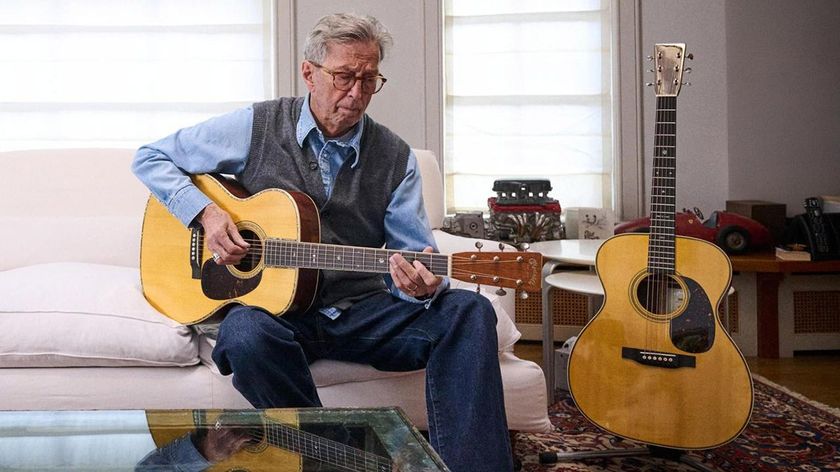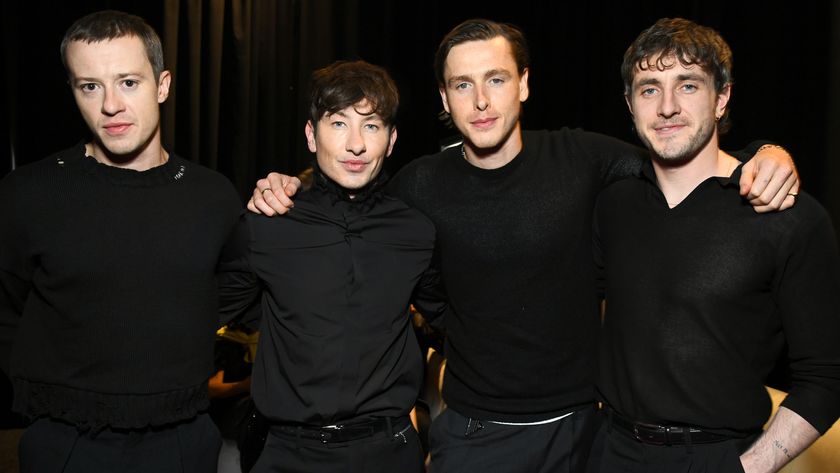
Neil Innes talks Bonzos, Beatles, Rutles and more
He's been a Bonzo and a Rutle, appeared on film alongside Pythons and Beatles, written everything from kid's TV shows to hit singles, and kept a sense of humour throughout it all.
Neil Innes has had the sort of career that could never have been planned, and has been all the better for it. We caught up with Neil to talk everything from appearing in Magical Mystery Tour to the knowledge of the ancients, the birth of The Rutles and the importance of finding the fun in everything you do...
What drew you to music initially? Were you from a musical household?
"My dad used to amuse us with a guitar, and sing terrible old Scottish songs about dead horses. You know, 'there's a bridle hanging on the wall,' or 'don't go down the mine daddy there's plenty of coal in the bin.' They were wonderful, they've stuck with me all my life.
"Then I got piano lessons when I was seven, and I was quite interested with that. There was a critical day when I had to play something different with my left hand to my right hand, and I declared at the age of seven that it was impossible. I had this really gentle teacher, he was a German guy because we lived in Germany – my father was in the army – and he said 'well, if you observe me closely, you will see that my left hand is doing something different to the right hand!'
"So I knew I had to apply myself. I really did, and I got quite decent at it. But then at 14 when I was playing Chopin, reading the dots and all that, I suddenly thought 'who am I working for? Every time I finish a really difficult piece they give me a harder one!' So I rebelled and got a guitar for thirty shillings. It was terrible, more like an egg slicer than a guitar. I met somebody later who had a real guitar, a Hofner, and it was really easy to push the strings down. That's how we all start, I think."
Music was presumably a hobby at that stage – when did you start thinking about making a career of it?
"Well, I had a twin interest which was painting and drawing. That was winning the race as it were, and so I ended up going to London Art School. When I was in London, and living in the house with Vernon Dudley Bohay Nowell on the floor below, he came up and said I've met these blokes called The Bonzo Dog Dada Band, you'd really like them and they need a pianist. And I thought ok, I'll give it a go.
"So I went up to the Royal College Of Art every Tuesday night and started thumping out these silly old jazz songs. That was the first time I'd used chord sheets. I quickly worked out what to do. I learned more about composition from chord sheets that from reading sight music."
Had you played in bands before? Because that sounds like quite an introduction to playing with others...
"But it wasn't really a band! It was a bunch of enthusiasts, some came, some went, but it was just a chance to have a good laugh. The Bonzos in the early days was just a bunch of art students having a laugh. Vernon and I, because it was a long way from where I lived in Blackheath to South Kensington, we found this pub in Forest Hill call The Bird In Hand, and it was a big room.
"We asked if our band could play in there, and they didn't mind. It was empty! We turned up and we started playing, and we passed the hat round. By the end of the evening the place was heaving! The bloke there said 'can you come back next week, we'll give you twenty five quid.' Whatever we were doing, it was brilliant drinking music."
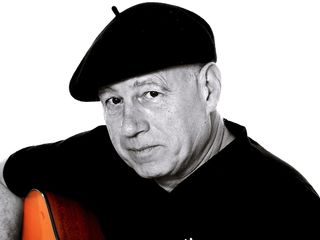
The Bonzo Dog Doo-Dah Band
How did Vivian Stanshall become involved, and how did that change things?
"He used to live with Rog, and then he sort of became a merchant sailor, and so they separated for a bit. Then he went to Edinburgh and worked with Linsey Kemp. It was when he came back from Edinburgh – I mean he was huge, he was a big bloke with a big red beard - and he decided to go all slim. He did it one summer by huffing boxes of fish. Then he came back, and so when we had The Bird In Hand he joined in because there was a bit of money. But he was the first person to start putting on a show as it were. He started being the frontman, and he was brilliant at it.
"I think more and more people came to see him. Because when you saw Vivian, in the early days, it was dangerous. It was just brilliant, but we tried to keep him off the instruments as much as possible. We ended up playing five or six pubs a week. Then there were about nine of us in the Bonzo Dog Doo-Dah Band, then about seven, and then six."
The Bonzos had this kind of improvisational, anarchic sensibility, but it had steel in the walls - you were serious musicians as well. It made for a very interesting mix.
"It was a mix. Some of us could really, really play, and some were more enthusiastic! But it was fun driven. There was one chap who used to play a thing called a helicon, which is like a sousaphone light – it wrapped round him. All of a sudden one evening he decided he was going to do a magic trick, so he rolled a newspaper into a cone and then poured a pint of beer into it. And it went all over the floor. It made us laugh! And it didn't matter. That was the atmosphere we were in.
"The pubs were full of trad bands who were trying to play proper trad jazz. But they weren't looking for stupid songs. We looked over the junk shops for stupid titles, like 'I'm Gonna Bring A Water Melon To My Girl Tonight, Hunting Tigers Out In India, Ali Baba's Camel. So we were finding novelty songs and having a laugh. Then we developed the idea of having comedy speaking balloons cut out of hard board which we would hold over people's heads.
The Bonzos bring their brand of anarchy to the television, performing Hunting Tigers Out In India on Do Not Adjust Your Set.
"It was a very visual thing we did. So we became very notorious. By the time we finished college, it was a no-brainer. We were offered some work up north and we decided to take it. We set off in Vernon's Daimler Ambulance, with no back seat – we had ordinary chairs in the back! - and off we went, exploding grandfather clock and all."
It's a noticeable theme of your career, you always seem to have followed the fun. There doesn't appear to have been any cold, calculated approach to finding success.
"No, it's never planned. We used to surprise each other, pull tricks on each other, and it was like that on stage. We did a bit of work to get a good forty five minutes, but it was all based around that from then on! If anyone wanted to do anything new they did it, and it it got a laugh it stayed in. Then because we had to make albums, we had to write new songs, but most of the stuff we recorded we couldn't actually do live, so we did different kinds of things. We didn't have the stuff you have nowadays. When we do The Rutles, Mickey's virtually a symphony orchestra with the keyboards. So we did what we could and mucked about, and it was good fun."
But it was pretty successful too. Was it a surprise that it got so bit?
"Yeah, but we weren't counting! It was just happening. We worked for five years all together, without a holiday, and we bought off three managers. So we must have been doing quite well! Rick Wakeman pointed out the other day that the Bonzos were the first band to go over £200 a night without being in the charts. We were one of the top paid bands in the country. It was on reputation alone. Of course when we did have a hit record, it was even more – in a way, we became the kind of thing we were sending up."
But it's an enduring success with the Bonzos – they seem to gather fans as the years go by.
"There was a reunion in 2006, and that was forty years since the first single, My Brother Makes The Noises For The Talkies. I was against it at first – how are you going to replace Vivian? You can't. But they said 'some people would like to try,' and I said 'who?' Well, Stephen Fry, Adrian Edmondson, they all came and they were word perfect. We can't do Vivian, but we can enjoy the songs."
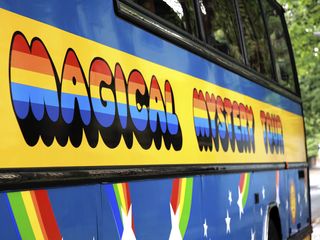
Magical Mystery Tour and I'm The Urban Spaceman
The Bonzos were, of course, involved in Magical Mystery Tour. How did that come about? Was it a surprise to be asked?
"No, not really, we just took it all in our stride. We'd heard that The Beatles used to come out and see us in the days when they wore false beards in order not to be recognised. We also kept bumping into Mike McCartney, Paul's brother, and he suggested the Bonzos to Paul when he heard that he was making this funny film. We then heard that he wanted us to do it, so we had to think about what we wanted to do.
"We'd just made Gorilla, so we sent Paul a copy which he listened to, and he chose Death Cab For Cuties as the one for the strip club. It was nice, because he said to me how much he'd liked Music For The Head Ballet, so he listened to it all. We sort of bonded actually. John and Ringo were there, filming the stripper with their own cameras. I said 'what are you doing?' and they said 'we're doing the Weybridge version!' But you know, the bond was it was guys in a van, going out and doing gigs. There's no side, you all know what it's like and you all laugh at the same thing. They were laughing at us doing backing singers with terrible plastic masks on, and we just had a good time."
What was the recording like? Was the set up of Magical Mystery Tour as loose as everyone thinks it was?
"We were in one day, we weren't on the bus, so we went to Raven's Revue Bar – that was the location – and we did it to playback. That was it, a day's filming! We always thought it was rather amusing because when it came out and the credits came up, there was a big credit, Bonzo Dog Doo-Dah Band, because it's alphabetical! Although it should have followed The Beatles, but there you go."
You went on to work with Paul McCartney later on to do I'm The Urban Spaceman as well.
"Well we did have a hit. But we couldn't get enthusiastic about having to make a single, we liked making albums. I'd written the song, and I don't know how it happened, but Viv used to hang out a lot at The Speakeasy and places like that, and he often hung out with Paul and John. He was with Paul one night, moaning about the fact that Gerry Bron, our manager and producer, said that nobody takes more than three hours to do a track.
The Bonzos perform the McCartney-produced I'm The Urban Spaceman.
"Viv was moaning about it, saying we can't get the blighter off the knobs, we've got these ideas and can't ever do them, and so Paul said 'well, I'll come and produce it.' So we went back to poor old Gerry and said we'd do the single, but we don't want to you to produce it. And he really fell right into it, saying 'and who do you think you're going to get?' Well, we're going to get Paul McCartney! He couldn't believe it.
"The day came and Paul came in saying 'oh, I've just written this,' and started playing Hey Jude, which takes forever as you know. I thought he was winding Gerry up, because it was taking forever, wasting studio time playing this dirge, but he really had just written in! None of The Beatles had heard it, probably!
"So eight and a half hours later, Viv said 'I think I'd like to play my hose pipe.' 'What's that Viv?' A length of garden hose with a trumpet mouthpiece and a plastic funnel at the other end. The engineer said 'you can't record that,' and Paul said 'yeah you can, just put a microphone in each corner.'
"But the of course the cruelest thing of all, right at the end when Gerry said, 'at least we've got Paul McCartney's name on the record,' we said we didn't want his name on the record. We didn't want any success on somebody else's coat tails. We were asked what we were going to call him, and somebody said Apollo C Vermouth. Paul thought it was a great name, so he said 'yeah, I'll be Apollo C Vermouth."
It's another great example of your way of embracing something but not being cynical.
"Well I think we wanted to be outside the swim of things. The fact that we were the Dada band, we just wanted to question everything. Dada came out of the First World War, showing how awful it was. The young men wanted to examine what they were doing as people. I was quite into that as a serious thing. I liked the fact that they were exhibiting urinals and drawing moustaches and beards on the Mona Lisa. I wanted to rebel in a creative way, to say I think that we can re-think the way we're thinking. I still think we could re-think the way we're thinking."
So Duchamp and people like that were key to your way of thinking?
"Absolutely. But we were the Bonzo Dog Dada Band, and changed it to Doo-Dah because we got fed up with trying to explain what Dada was!"
Ideas like Dadaism are well known now – were they more fringe at the time?
"The art school community were right there, they were really keen on it as well. The fact that there's a bit exhibition at the Tate Modern now of Richard Hamilton, he actually re-made some of Marcel Duchamp's things. He was a bit like Socrates, sentenced to death for impiety and corrupting the young – I can't think of anything better to do!"
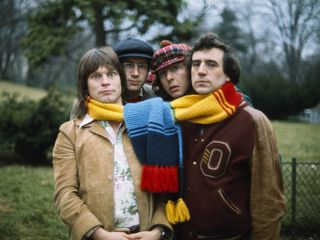
Do Not Adjust Your Set, Monty Python,
Talking about corrupting the young, let's talk about Do Not Adjust Your Set. Was that where you first met Eric Idle and some of the Pythons? Or did you know them already?
"No, that's exactly how we met. Humphrey Barclay had been tasked with making a children's program. He came from Cambridge so he knew Eric [Idle], and he's also seen the work of Michael [Palin] and Terry Jones. They were already in children's television writing stuff, and he liked them so he got those three together. He found David Jason, so he was quite a talent spotter. We circled each other a little in suspicion, but in the end we made 26 programs which are still legendary in many ways.
"And they were the test run if you like for Python. In the second series, Terry Gilliam joined us, so if there was ever a demo of what Python was going to become... They knew they didn't have to end a sketch in the normal way, they could suddenly go into animation and then, now for something completely different! And that's refreshing. That's all the Bonzos ever wanted to do, to say that there's another way! It doesn't have to be corny and the same old all the time. Python was in a similar mode. And Eric is on record as saying that the Bonzos taught them anarchy!"
"Did you know that in Japan there's a magazine called Strange Days? All it's about is The Beatles, The Bonzos, Python and The Rutles. God knows what they find to write about, but they've found a connection there, and there is a connection. George [Harrison] is on record as saying that what should have happened is that The Beatles should have got together with The Bonzos and the Pythons and The Rutles and had a good time."
The sense of humour and the anarchy in the way that you approached your creativity is certainly the link there. As you moved forward and worked with Python, especially with your songwriting, how did you retain that sense of freedom?
"When they were thinking about making a record, I was first choice because we knew each other well. I hadn't met John [Cleese], so I met John and Graham [Chapman] after one of their shows. We went for a meal, and they said they were making a record and would I help them out with the music? I said 'what sort of songs have you written?' and Eric said 'well, Michael's written a thing about agrarian reform in the middle ages.' Oh, alright, ok! Get in there before Motown!
"And John Cleese, who wants to know what's what, said 'what sort of music for that then, Neil?' I said I don't know, what about reggae”? It was exactly like going into the Bonzos again. It was lucky. You can't plan these things. The Bonzos had wonderful chemistry, Python had wonderful chemistry. It was irresistible. We did records, then we did tours, and it was such great fun."
Some of your stuff with Python is just great – the Hollywood Bowl for example. What are your memories of performing there?
"I have wonderful memories of it. The first thing was that I didn't have my duck for my head for How Sweet To Be An Idiot. Air Canada lost it. You can't write this stuff! I bought it in Woolworths, and we were on the phone to the head of Woolworths in New York to find this duck. They were called Quacksies, and when you took the wheels off they made a hat. It was just ridiculous. Somebody got to hear about this, and there was a cartoonist from Pittsburgh called Wayne Olaf, I'll never forget. He'd got one, he'd made his own, and he sent me his. I've still got it. So Hollywood Bowl, didn't have my duck.
Neil Innes performs How Sweet To Be An Idiot, sans Duck.
"But what was the naughty thing, I did the Protest Song, which you never saw. Every night in the stadium the whole audience was lit up as I was doing it. All four nights, the bastards were using my song to do cutaways of the audience laughing! That was the sort of stuff that went on."
You also appeared in Monty Python And The Holy Grail, what was it like to shoot that?
"It's a wonderful film. A lot of the songs of mine are still in there, the little medieval things. Terry Gilliam and I used to share dressing rooms, because we were from the art world as opposed to the word world. Cleese used to say Terry was subhuman because he was American and couldn't talk properly. 'What do you mean, a whole bunch of water?'
"I felt that the basic insecurity of these literary people meant that every time anything heavy was lobbed out of a castle, it landed on me. The cow, the wooden rabbit. When I was up on the battlements and keys turns round to tell me to get the cow, he says to me 'fetchez la vache.' I was just supposed to get up and go, so I said 'Quoi?' So I built the part! And all the better for it – 'fetchez'? Ha! It was a blast.
"The tragic thing was I wrote really good tunes for King Arthur, for two french horns and about eight violins, because that's all we could afford. The budget was £3000 for the music for the movie. It was heroic, but it sounded really weedy on such a small line up. In the end Terry rang me up and said that with the coconuts and everything else, they couldn't have weedy music.
"They tried this library music with 140 people banging and scraping any old thing, and it really works because it's a big noise. It's a counterpoint to people with coconuts. And he was absolutely right. I didn't mind, but I was a little bit sad my tunes didn't make it because of money."
Neil sings one of the more memorable songs from Monty Python And The Holy Grail.
But you're all over the film anyway.
"Terry Gilliam is such a great film maker. Filth, smoke, everything. When Michael had his 60th birthday, Terry Jones said this wonderful thing. He said 'he's such a nice chap, but he has lost his temper on two occasions. One was in Paris when we were promoting the Holy Grail. We were walking round and Terry kept saying that there might be a better restaurant elsewhere, and after two hours Michael said 'for God's sake this is Paris, they're all good!' And the other time was in Holy Grail.
"They all mucked in and did every job, and Michael was playing a peasant with a basket on his bottom. He was going around eating mud, and they'd put all this chocolate down for him. They kept doing it again and again, and there was all this smoke, and finally the dirt got mixed with the chocolate. There's a lovely photograph of him somewhere with his face covered in chocolate. He was there at the rushes, and they showed him the shot, and you couldn't see his face or him eating the chocolate, and he lost it. Understandably!"
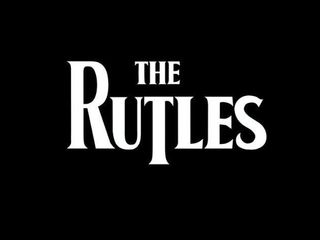
The Rutles
Let's turn to The Rutles now. It was a sketch initially on Rutland Weekend Television, wasn't it?
"The way it worked was that Eric wrote stuff, and then I was covering the music bases and coming up with musical ideas. It was supposed to be a television station, so it wouldn't just be talking, you'd have to break it up. So it was my job to think up cheap musical ideas and song ideas. One of them was to do a spoof of Hard Day's Night, because it was black and white, speeded up, four guys, four wigs, tight trousers, pointy shoes, running around a field. It's got to be cheap! It was a cheap joke!
"Eric had this idea for a documentary maker who was so dull the camera ran away from him. And so it started off as a scene with someone suffering from love in the hospital, as if it was a disease. Then it turned into the spoof, and then it turned into talking about the Rutles. We then coined the word 'Rutle', which I didn't like at the time. I wish we called it The Bootles or something. Bootle was a part of Liverpool, and it's very close to Bootleg. Anyway, that's how The Rutles started, and then of course it was shown on Saturday Night Live.
"Sid Bernstein was trying to get The Beatles together again, and offering them millions of dollars each. It was getting silly, and something sillier had to be done. So we showed it on Saturday Night Live – they'd got Eric to do the hosting because he said he could get The Beatles back together for $300. They set it up, and when Eric took over the hosting, they said 'sorry, he hasn't got The Beatles back together, it was a bad phone line. He's got The Rutles!'
"They showed the clip, and that's when the audience all kicked in and started saying 'We want The Rutles!' So we did the whole story, went and got the money and made the now famous mockumentary All You Need Is Cash. Everybody knew somehow that The Beatles were never going to get back together again, and the real story, Brian Epstein dying and everything, it was too sad. Something sillier and funnier needed to be done, and that's when George thought 'I want to see this'.
"That's when he got really involved. He got footage from Neil Aspinall that turned into Anthology, and we actually used bits of teenagers and audiences from there so that we could shape it and tell the story in a new way. George of all of them, probably, wanted to put the suits in the cupboard and move on. John really loved it too. Ringo might have thought some of the drumming jokes were a bit out there. Paul was fine about the music, I've talked to him about it since, but I think he took exception to the way Eric played 'him' as it were."
All You Need Is Cash features songwriting that's so sharp, and the sound is so good and so close to those Beatles records. Did the songwriting come easily? How did you approach it?
"I knew if I had to write all these songs that were going to be credible as Beatles songs, I would be sunk if I listened to a lot of Beatles songs! I didn't do which lots of people think I did, which is take a little bit of this and a little bit of that. I decided not to listen to any Beatles songs at all, and instead tried to remember where I was when certain Beatles songs came out. I used my life and my memory to think about teenage love and things like that – Hold My Hand, you know.
"The psychedelic ones are fun to write. I had to be more disciplined then, because not any old thing will do. It's not just putting a pickled onion on a hairbrush. It's not surrealism, you have to have a bit more to it than that. I didn't want to trivialise Beatles songs, so I tried to make the songs about things. Even Cheese And Onions, which is about 'man and machine, keep yourself clean, or be a has-been like the dinosaurs.' It is only pop. You can only do so much!"
Cheese And Onions - The Rutles go psychedelic.
"The sound was definitely down to Steve James, the engineer – Sid James' son. He wanted to take no chances. We recorded it at 30 inches per second on 2 inch tape. We got it to where it was all sounding fantastic, but it still wasn't right. It suddenly dawned on us: it sounded too good! So we took the mix and compressed it, took a bit off the top and a bit off the bottom, that was more like it. We did the same thing again, and it started to sound like it had been made on four tracks. The first album was like that, the second album we made it a bit more hi-fi. Archaeology, that was such a joy to make. I think it's the better album if you look at the music and the songs.
"No, I didn't want to do anything to diminish their songwriting. But mostly The Rutles is production sounds, and speaking Rutlese every now and then!"
You managed to achieve certain sounds and styles that many bands have tried to do in a very serious way since. Your creativity seems to be based in play, but the end result is always better for it.
"You can't force that. Analysing something kills the spark. It's more to do with, let's play Batman and Robin now. You get happiness coming into it. Even though it is a miserable world, you can't shirk it but you can have it in there. It's not dominating anything. I've written other songs, but the songs in Archaeology were more or less my songs. They weren't written to be any particular Beatles songs. When I went to see George to play him some of them, he was sitting there with a smile on his face waiting to hear which song was which, and then he suddenly realised: 'these are your songs! Don't be shy.'
"You can take the song Joe Public and do it a hundred ways. We decided to do it like an indian sitar thing, but the song is still the song. Somebody said to me the thing about Bach is that you can play it on school recorders and it will still sound good. But you can't do that with Tchaikovsky, because it's all in the arrangements.
"The other thing I didn't mention was that when I'd written the Rutles songs for the first album, the rule was if I could play it just on the guitar or on the piano to somebody else, and it works as a song, then I know it's alright. Not hiding behind harmonies or dressing, it's a basic song.
"It's funny, the only down thing about The Rutles is that it branded me as a parodist. But I'm not! Not really, I write songs. Some of them are silly, but some of them are not, some of them you can think about. But that puts people out of their comfort zone in the music business. They like you to be one thing or the other. And I refuse to be like that, because I'm a Bonzo!"
You never seem to have gone after fame or anything like that.
"No. You have to work to be famous, or want it. And I've never wanted it, and I'm a complete stranger to work! I love all the toys and being able to play with great musicians, and being able to make enough of a living to be able to do that. I'm happy with that.
"I have to quote Seneca now – some of the best ideas in the world are a thousand years old, but Seneca said it most succinctly. 'We should measure wealth not by how much we have, but how little we need.' And that's my philosophy."
It's a good one...
"It's not bad!"
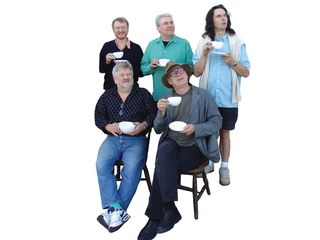
Rutling again, Monty Python reunion and Raggy Dolls
Obviously you're back on the road with The Rutles now.
I thought it was all finished, I though it was finished when we did Glastonbury. But something else came up and we did some more. We love it. There's the five of use. Mickey Simmons on keyboard, Mark Griffiths on bass – he's played with The Shadows, but he's a really good jazz guitarists – and there's Ken Thornton on lead guitar. He's the guest if you like. And there's John Halsey on the drums.
"We did eight gigs last August, and it was such a blast we thought we'd do some more while it's up and running and in our heads. So we're doing more this spring, and we're going to Tokyo immediately afterwards. So you never know, there might be more! But I don't look too far ahead. This might be it. We're not trying to do the film. Eric isn't there, he wasn't involved in the music side of things. Ricky [Fataar, original guitarist] has just come off the road – 22 months on the road with Bonnie Raitt – and all he wanted to do was sit on a beach!
"So it's only me and John from the original line up. That was the film. You can always watch the film. You can't always listen to the songs live and join in. And John Halsey is one of the only drummers alive who can make you laugh with a drum solo.
"It's more like a mixture of Bonzos and Rutles than Rutles. It's nothing to do with The Beatles anymore! We got a great live album out of last year as well, recorded into two tracks. There's no mixing, it's how it came. There's 14 really great tracks. The more I've listened to it now it's been mastered, what luck! It's like a photo album of the last tour. It's on sale on tour, and it'll go into shops after that."
Obviously there's a Monty Python reunion coming up. Are you involved in that at all?
"I can't see myself doing it. I think some of the others would like me doing it. But Eric Idle is in charge. And he's got Arlene Phillips, and boy and girl dancers, and a band. You don't really need an idiot with a duck on his head and a piano! Now Eric's gone all show business, he sees it as he sees it. It fills me with horror to be honest. I remember the closing ceremony of the Olympic games, and I hope it's not going to be like that."
There's one other thing to ask you about on top of everything else: you wrote one of the best kid's TV theme tunes ever, which was Raggy Dolls [1980s British children's cartoon].
"I didn't just write the theme tune, I wrote the shows and did all the voices! That's me! I was asked to do the voices, and I agreed to do because I liked the idea. It's a great thing to teach kids. Nobody's perfect, and if you muck along together you can solve things. It turned out that the guy who had the idea had written one, and I was supposed to be script editor and do the voices.
The now-legendary Raggy Dolls theme tune.
"They asked me to write it in the end, and we did over a hundred. And I thoroughly enjoyed it. There was a lovely thing that happened right at the end. A mother wrote about her daughter who had started watching it. Her daughter was autistic, and sometimes it can happen that they get fixed on something. She got fixed on the Raggy Dolls, and they could use it to turn her around and make her a little bit more so social. I thought that for that one girl alone, it was all very, very worth it.
"It's nice to do things that feel right. I've been lucky enough to have the opportunity to do it. I'm very pleased about that."
For more information visit the official Neil Innes website. Connect with Neil on Facebook and Twitter.
The Rutles are on tour now – get tickets here.
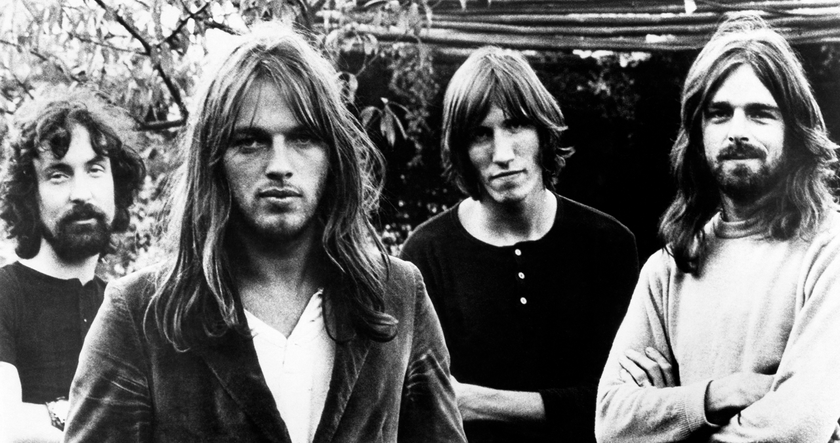
“I’ve often wondered if it was the Devil grinning up at me, or God smiling down on me. I still haven’t figured out who had the final say”: How a feat of spontaneous creativity resulted in one of Pink Floyd’s most majestic moments

“I didn’t even realise it had synthesizer on it for decades”: This deep dive into The Beatles' Here Comes The Sun reveals 4 Moog Modular parts that we’d never even noticed before

“I’ve often wondered if it was the Devil grinning up at me, or God smiling down on me. I still haven’t figured out who had the final say”: How a feat of spontaneous creativity resulted in one of Pink Floyd’s most majestic moments

“I didn’t even realise it had synthesizer on it for decades”: This deep dive into The Beatles' Here Comes The Sun reveals 4 Moog Modular parts that we’d never even noticed before
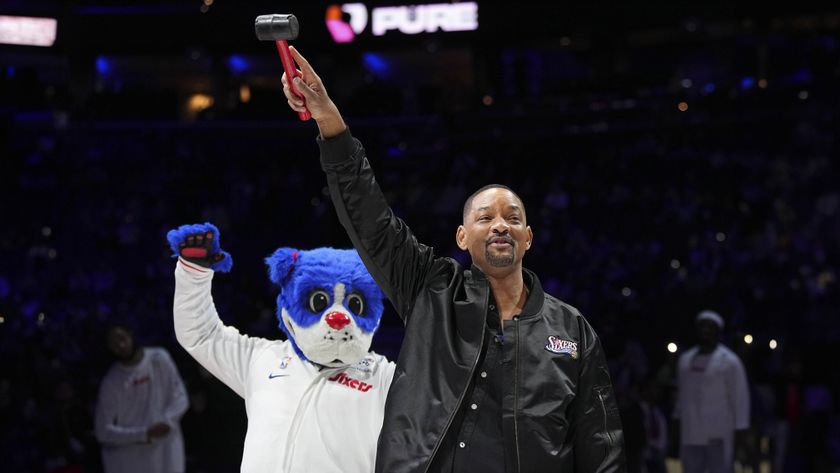

![Chris Hayes [left] wears a purple checked shirt and plays his 1957 Stratocaster in the studio; Michael J. Fox tears it up onstage as Marty McFly in the 1985 blockbuster Back To The Future.](https://cdn.mos.cms.futurecdn.net/nWZUSbFAwA6EqQdruLmXXh-840-80.jpg)
